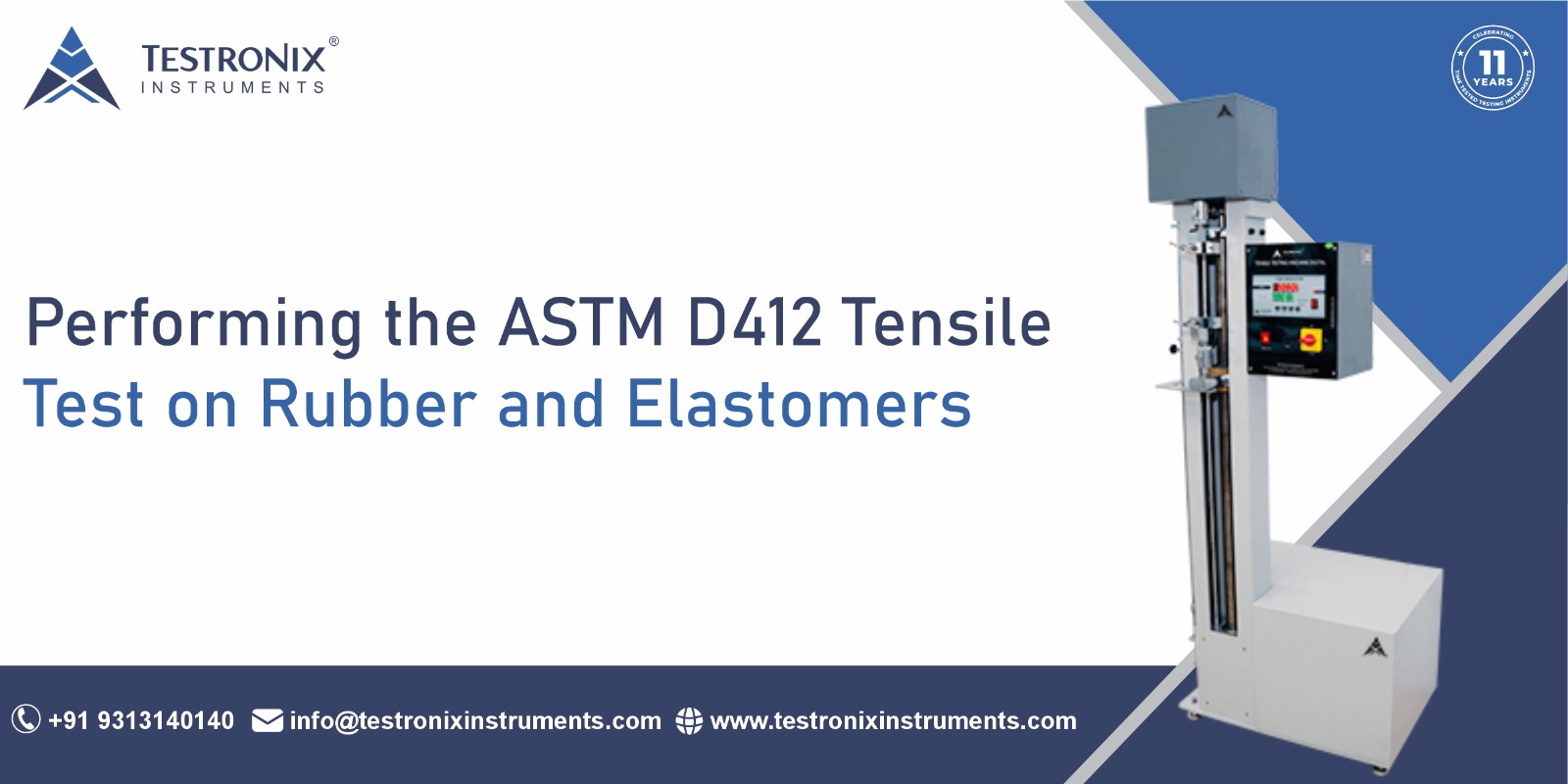Reviewed by Anurag Mishra (Sr. Technical Consultant)

It is the standard by which every manufacturer measures the resiliency, strength, and durability of any product and thus one of the highly accepted evaluation standards for evaluating the tensile properties of materials in the field of rubber and elastomeric compounds. Increasingly in applications, such as automobiles, medicine, and consumers, rubber material demands increased requirements; thus, such a standard becomes critical for ensuring dependability and performance in a product. Therefore, the tensile strength, elongation, and stress-strain behavior assume importance in material selection and design, and quality control through ASTM D412.
ASTM D412 is meant to measure the following tensile properties:
(a) Tensile Strength: This will describe the stress that the material will withstand without break, once it has been tugged or stretched.
(b) Elongation Strength: This refers to the extent to which one can stretch or pull on a material before breaking it. This is regarded as flexibility.
(c) Elastic Modulus: It is the stress to strain ratio in a material. The measure defines the stiffness of the material.
At Testronix, we understand that proper testing will be extremely important for optimizing product durability and reliability. Being specialists in material testing with a record of over a decade in this field, we pride ourselves in developing advanced solutions which conform to the tough tests as described by ASTM D412.
Our innovation and sustainability will enable the production of testing systems with quality, and every piece of rubber or elastomer would surely be up to required quality standards. Quality in our work and in every detail we do leads us toTestronix.
They are versatile in nature and therefore are basically utilized by their elasticity, resilience, as well as strength. ASTM D412 tensile testing by the manufacturers defines whether material fulfills the properties desired for application in any particular application. Tensile testing is most crucial for those industries which need strong performance: automotive, aerospace, and healthcare. With Consistent tensile testing:
Materials can endure tension and compression without loss of integrity.
Formulation enhancement contributes to improved performance.
There is less failure of the products that result in higher customer satisfaction.
To perform ASTM D412 tensile testing, the following apparatus is essential:
i) Universal Testing Machine or UTM: This equipment is the main instrument in which controlled force can be applied to the sample. The load cells and grips in a good UTM are very accurately designed for a rubber sample.
ii) Grips and Fixtures: For holding the sample without slipping and damaging, grips specific for rubber samples should be provided, considering its high elastic nature.
iii) Extensometer: It measures elongation during testing. This offers real-time data on strain of the sample.
It is highly recommended to take precise data with advanced UTMs that are computer interface-based to get accurate results with smooth analysis.
The ASTM D412 test standard provides two major methods of testing, one adapted to each of the various testing approaches:
(a) Method A
Constant Rate of Grip Separation: The grips travel at a constant rate that separates the grip until the sample breaks. It is often used where large deformations are expected.
(b) Method B
Constant Rate of Elongation: The grip separates at a constant rate until sample break-up, normally the samples deform uniformly.
Both types attempt to replicate what happens in practice. Of course, which one of the two is better adapted to the particular requirements of an application and a given material depends.
ASTM D412 is critical because it aids in developing a standard system through which the tensile properties of rubber could be tested where the material would have to be verified to determine whether it met the related requirements concerning the durability as well as flexibility of the rubber for quality and safe purposes.
The automotive, health care, consumer products, and aerospace sector relies on the ASTM D412 for the rubber element that fulfills the respective performance needs.
Look for the universal testing machines which must be designed with accuracy to grip such that it shall not be slided out and in addition extensometer elongation.
The advanced UTMs offer a high degree of automation capabilities, which ensure that testing is carried out uniformly and data is recorded. This means accuracy and efficiency are ensured.
Testronix allows the use of high tech, ecologically friendly testing equipment with minimal waste energy and materials.
This test, which is none other than the tensile test according to the ASTM D412 test standard, can be described as one of the most elementary tests developed to date in the world of testing rubber and elastomers; the impact would be on reliability, safety, and durability in the final product. Hence, if companies want to make high-quality rubber and elastomer products, compliance with this standard will result in improved product performance and satisfaction of the consumers.
With Testronix Instruments know-how and cutting-edge testing solutions, manufacturers can have full assurance that their materials are thoroughly tested for both performance and sustainability goals. As the industries keep on innovating, the necessity of precise and reliable testing like ASTM D412 will be only greater, thereby giving a strong boost to consumer confidence and sustainable development in product manufacturing.